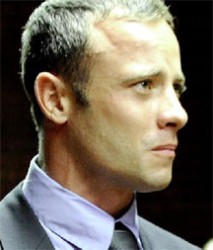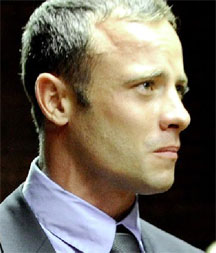PRETORIA, (Reuters) – One of the first people on the scene after Oscar Pistorius shot girlfriend Reeva Steenkamp told a court on Thursday he feared the Olympic and Paralympic star, now on trial for murder, might kill himself with the same gun.
Testifying on the fourth day of the trial, neighbour Johan Stipp said he entered the athlete’s home, minutes after hearing screams and shots, to find the distraught South African sprinter kneeling over the lifeless body of a woman.
“I shot her. I thought she was a burglar and I shot her,” Stipp quoted the 27-year-old Pistorius as saying.
Stipp, a doctor, went on to describe his futile attempts to revive Steenkamp, a 29-year-old model and law graduate who had been dating Pistorius for a few months.

She died after being hit by three rounds, including one to the head, out of four fired by Pistorius through the locked door of an upstairs toilet. He denies murder, arguing that he made a tragic mistake after mistaking her for an intruder on Valentine’s Day last year.
As Stipp checked Steen kamp for signs of life, Pistorius was begging him to save her life, Stipp told the court.
“Oscar was crying all the time. He prayed to God: ‘Please let her live, she must not die,’” he said.
At one point when Pistorius left Steenkamp, Stipp and housing complex manager Johan Stander to go upstairs, Stipp thought the athlete might be about to kill himself.
“I noticed that Oscar was going upstairs and I asked Mr. Stander if he knew where the gun was because it was obvious that Oscar was emotionally very, very upset,” he said.
“I didn’t know the situation in the house so I thought maybe he was going to hurt himself.”
SLUMPED IN THE DOCK
During Stipp’s graphic testimony, including his assessment that Steenkamp was “mortally wounded”, Pistorius sat slumped in the dock, his head bowed and his hands covering his ears.
Pistorius had his lower legs amputated as a baby but went on to achieve international fame as the “fastest man on no legs”, running on carbon-fibre prosthetic limbs.
Already one of the best-known Paralympic athletes, he ascended to the pantheon of track greats at the 2012 London Olympics when he reached the 400 metres semi-final, competing against able-bodied athletes.

